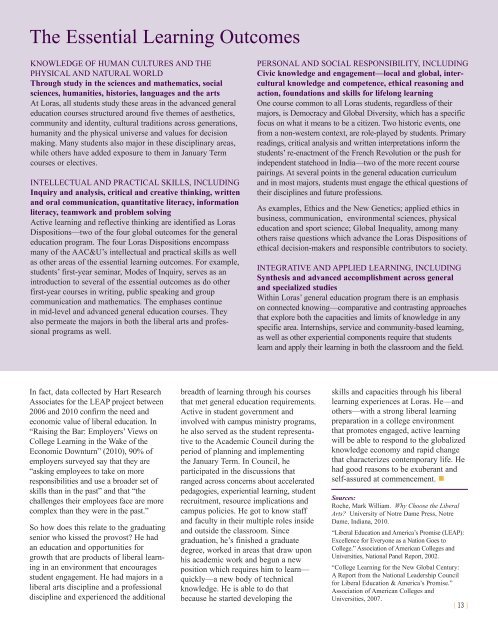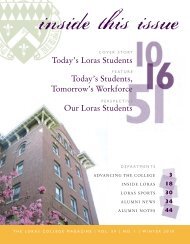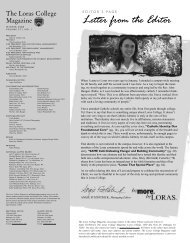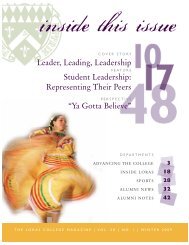THE LORAS COLLEGE MAGAZINE | VOL. 59 | NO. 1 | WINTER 2010
THE LORAS COLLEGE MAGAZINE | VOL. 59 | NO. 1 | WINTER 2010
THE LORAS COLLEGE MAGAZINE | VOL. 59 | NO. 1 | WINTER 2010
Create successful ePaper yourself
Turn your PDF publications into a flip-book with our unique Google optimized e-Paper software.
The Essential Learning Outcomes<br />
K<strong>NO</strong>WLEDGE OF HUMAN CULTURES AND <strong>THE</strong><br />
PHYSICAL AND NATURAL WORLD<br />
Through study in the sciences and mathematics, social<br />
sciences, humanities, histories, languages and the arts<br />
At Loras, all students study these areas in the advanced general<br />
education courses structured around five themes of aesthetics,<br />
community and identity, cultural traditions across generations,<br />
humanity and the physical universe and values for decision<br />
making. Many students also major in these disciplinary areas,<br />
while others have added exposure to them in January Term<br />
courses or electives.<br />
INTELLECTUAL AND PRACTICAL SKILLS, INCLUDING<br />
Inquiry and analysis, critical and creative thinking, written<br />
and oral communication, quantitative literacy, information<br />
literacy, teamwork and problem solving<br />
Active learning and reflective thinking are identified as Loras<br />
Dispositions—two of the four global outcomes for the general<br />
education program. The four Loras Dispositions encompass<br />
many of the AAC&U’s intellectual and practical skills as well<br />
as other areas of the essential learning outcomes. For example,<br />
students’ first-year seminar, Modes of Inquiry, serves as an<br />
introduction to several of the essential outcomes as do other<br />
first-year courses in writing, public speaking and group<br />
communication and mathematics. The emphases continue<br />
in mid-level and advanced general education courses. They<br />
also permeate the majors in both the liberal arts and professional<br />
programs as well.<br />
In fact, data collected by Hart Research<br />
Associates for the LEAP project between<br />
2006 and <strong>2010</strong> confirm the need and<br />
economic value of liberal education. In<br />
“Raising the Bar: Employers’ Views on<br />
College Learning in the Wake of the<br />
Economic Downturn” (<strong>2010</strong>), 90% of<br />
employers surveyed say that they are<br />
“asking employees to take on more<br />
responsibilities and use a broader set of<br />
skills than in the past” and that “the<br />
challenges their employees face are more<br />
complex than they were in the past.”<br />
So how does this relate to the graduating<br />
senior who kissed the provost? He had<br />
an education and opportunities for<br />
growth that are products of liberal learning<br />
in an environment that encourages<br />
student engagement. He had majors in a<br />
liberal arts discipline and a professional<br />
discipline and experienced the additional<br />
breadth of learning through his courses<br />
that met general education requirements.<br />
Active in student government and<br />
involved with campus ministry programs,<br />
he also served as the student representative<br />
to the Academic Council during the<br />
period of planning and implementing<br />
the January Term. In Council, he<br />
participated in the discussions that<br />
ranged across concerns about accelerated<br />
pedagogies, experiential learning, student<br />
recruitment, resource implications and<br />
campus policies. He got to know staff<br />
and faculty in their multiple roles inside<br />
and outside the classroom. Since<br />
graduation, he’s finished a graduate<br />
degree, worked in areas that draw upon<br />
his academic work and begun a new<br />
position which requires him to learn—<br />
quickly—a new body of technical<br />
knowledge. He is able to do that<br />
because he started developing the<br />
On The Cover | Summer <strong>2010</strong><br />
PERSONAL AND SOCIAL RESPONSIBILITY, INCLUDING<br />
Civic knowledge and engagement—local and global, intercultural<br />
knowledge and competence, ethical reasoning and<br />
action, foundations and skills for lifelong learning<br />
One course common to all Loras students, regardless of their<br />
majors, is Democracy and Global Diversity, which has a specific<br />
focus on what it means to be a citizen. Two historic events, one<br />
from a non-western context, are role-played by students. Primary<br />
readings, critical analysis and written interpretations inform the<br />
students’ re-enactment of the French Revolution or the push for<br />
independent statehood in India—two of the more recent course<br />
pairings. At several points in the general education curriculum<br />
and in most majors, students must engage the ethical questions of<br />
their disciplines and future professions.<br />
As examples, Ethics and the New Genetics; applied ethics in<br />
business, communication, environmental sciences, physical<br />
education and sport science; Global Inequality, among many<br />
others raise questions which advance the Loras Dispositions of<br />
ethical decision-makers and responsible contributors to society.<br />
INTEGRATIVE AND APPLIED LEARNING, INCLUDING<br />
Synthesis and advanced accomplishment across general<br />
and specialized studies<br />
Within Loras’ general education program there is an emphasis<br />
on connected knowing—comparative and contrasting approaches<br />
that explore both the capacities and limits of knowledge in any<br />
specific area. Internships, service and community-based learning,<br />
as well as other experiential components require that students<br />
learn and apply their learning in both the classroom and the field.<br />
skills and capacities through his liberal<br />
learning experiences at Loras. He—and<br />
others—with a strong liberal learning<br />
preparation in a college environment<br />
that promotes engaged, active learning<br />
will be able to respond to the globalized<br />
knowledge economy and rapid change<br />
that characterizes contemporary life. He<br />
had good reasons to be exuberant and<br />
self-assured at commencement. �<br />
Sources:<br />
Roche, Mark William. Why Choose the Liberal<br />
Arts? University of Notre Dame Press, Notre<br />
Dame, Indiana, <strong>2010</strong>.<br />
“Liberal Education and America’s Promise (LEAP):<br />
Excellence for Everyone as a Nation Goes to<br />
College.” Association of American Colleges and<br />
Universities, National Panel Report, 2002.<br />
“College Learning for the New Global Century:<br />
A Report from the National Leadership Council<br />
for Liberal Education & America’s Promise.”<br />
Association of American Colleges and<br />
Universities, 2007.<br />
{ 13 }





![Printable Annunal Report [pdf] - www.loras.edu - Loras College](https://img.yumpu.com/4580579/1/190x245/printable-annunal-report-pdf-wwwlorasedu-loras-college.jpg?quality=85)
